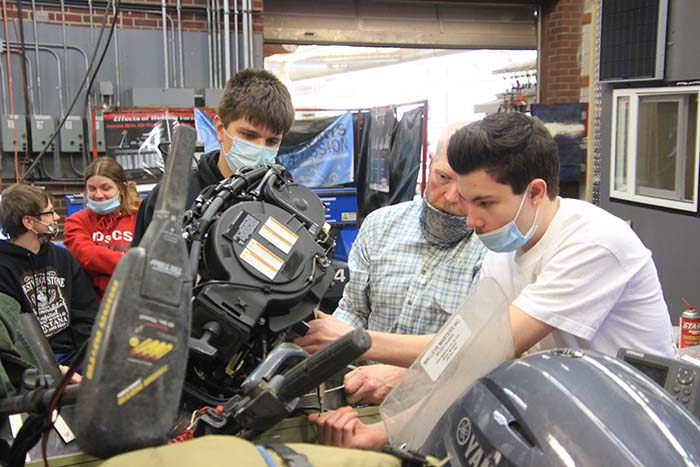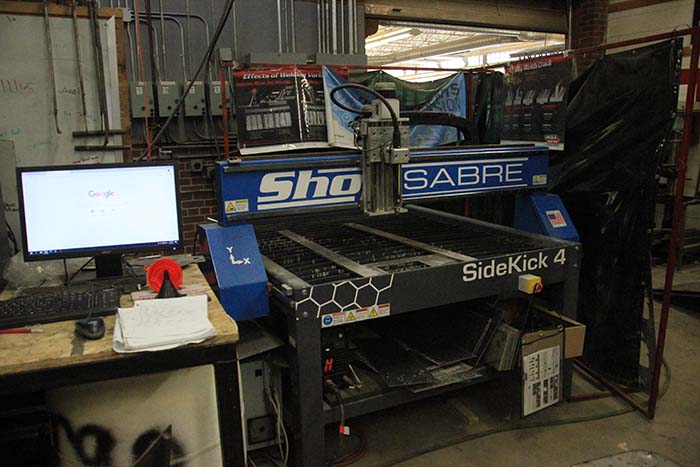Learning the trades of the shop, home
News | Published on April 7, 2021 at 5:49pm EDT | Author: Chad Koenen
0
Ethan Houselog and Chris Rinicker learn how to change the poil on a small boat engine during a recent class at Henning School. Shop teacher Eli Hill (center) teaches several home survival classes that show students how to do everything from hang dry wall to install windows and change oil on vehicles.
By Chad Koenen
Publisher
In the corner of Eli Hill’s shop at Henning School, a group of students pull wire through the shell of a new fish house. Just an arms length away another dozen students change the oil in a small boat engine, while talking over the loud noise of a grinder just a few dozen feet away. Just out of sight, an unfinished bench waits for students to return and complete what will eventually become a focal point at the Henning Rifle Range. That doesn’t include the notebook full of instructions on how to utilize a new plasma cutter that was recently purchased by the school through a generous grant, which sits just on the other side of the students who are carefully putting new oil in the boat engine.
There is, perhaps, no classroom with more activity going on at one time than Hill’s shop class each day. The projects change daily, but the goal is to teach students everything from basic life lessons to how to build a luxury ice fishing house from the ground up.
All of these projects continued this year despite high schoolers being in hybrid and distance learning model for much of the fall semester. In order to prepare for the challenges being presented by COVID-19, Hill asked students early this fall about what kind of power tools and working environment they had at home to continue the lessons they learn in the classroom. He said he is proud of the work the students have put in given all of the challenges due to COVID-19.
“Despite all of the challenges this year I’m really proud of all of my students and have enjoyed seeing them develop hands on skills. I think problem solving is a big part of everything, whether it’s working with wood, metals or computers, I feel confident that these kids will succeed in the workforce and can tackle most any problem put in front of them,” said Hill. “All of my seniors have good solid plans to continue their education after graduation and many of them are going into the trades in areas such as small engine repair, welding and automotive repair.”
While building a new ice fishing house might be one of the highlights of the school year, it’s the little projects that will provide some of the framework for creating lifelong lessons. In his woods class, Hill’s students have been making picture frames, shadow boxes, TV tables and custom signs using the new CNC router. While at home, students created everything from ice houses to stools, deer stands, night stands, finished a basement and even made coffee tables.
“I was really glad to see student participation working on individual projects at home, everyone worked safely and some quality projects got built. Although we weren’t able to take any field trips, or have guest speakers due to COVID-19, we did have some virtual guest speakers and tours of NDSCS and Northwest Tech of Bemidji. Henning graduate Cody Dolezel shared his surveying program at NDSCS with our students and last week we got a virtual tour of the small engines program there at Wahpeton. We also had guest speakers Northwest Tech speak about the plumbing program in Bemidji.”
Eli Hill
In his small engines class, students learned how to disassemble, inspect and reassemble a vertical shaft lawn mower engine and horizontal shaft snowblower engine in class. When they were at home the students worked on whatever they could find in their garage including lawn mowers, ice augers, snowmobiles, chain saws, gas powered water pumps, ATVs and more. In the end, the goal was to get the engine running and share that purring sound with the rest of the class.

“The best distance learning days were days when everyone had something to work on during our daily Google meet and at the end of class they all started their engines and revved them up. To me hearing the engines and seeing the smiles that was the sound of success,” said Hill.
The home survival class has also remained busy by constructing a new ice fishing house. Hill said the group has built the fish house from the ground up, which means they have learned how to frame walls, put in doors and windows, install siding, insulate and wire, as well as install tongue and groove planking. The class essentially focuses on basic repairs and maintenances for the home, cars and equipment like lawn mowers and snowblowers. The class even spends each Friday learning about vehicle upkeep like changing a tire, replacing taillights, checking battery acid and changing the oil.
“Basic auto maintenance is a skill everyone should know and I’m glad my students learn these skills while in high school so that they grow up to self reliant,” he said.
Hill said the class is important to show students how to identify and even fix some common problems that will occur later in life. By giving them the skills to do the work themselves, the hope is to save them money on future home and vehicle repairs.
While the students never have a shortage of projects to work on from one day to the next, Hill also allows students to work on their own vehicles and projects as well. He has also allowed community members to have students in his classes to construct things like a warming house and outdoor benches to give students a fresh project to work on for the community. The partnership is a win-win as people can get their projects completed for the community and Hill can provide a learning experience without having to find ways to fund all of the materials for the projects.
“My biggest challenge is paying for material costs so if someone is willing to supply the materials my students and I will supply the labor. I think there is a lot of value to making something that is out in our community where students can point at something and proudly say ‘I made that,’” said Hill.
Even the younger students at the school have gotten involved in the shop as the seventh graders focused on computer CADD design to help design a CO2 car. The fifth graders have even created some wooden ducks and the sixth graders have focused on creating their own windmills. In eighth grade, students are working on robotics and animation.
In addition to their conventional projects from the past, Hill and the rest of his shop students have the opportunity to learn how to operate a Shopsaber CNC plasma table. The $17,000 piece of equipment allows students to cut out most any shape out of steel and aluminum sheets/plates.
Since Hill is a Career and Tech Ed certified teacher, the school district received a Carl Perkins Grant to help purchase the machine. The hope is to have students start making custom signs for the public as soon as next year, in a similar fashion as what has been done at the Bertha-Hewitt School District.
“Now that we are back in school the kids really enjoy learning to use the plasma cutter and I challenged a few of my seniors to read the directions and figure out how to set it up and operate the machine and they did just that,” said Hill. “I then asked them to write out the steps to setting up and operating the machine and then teach the next kid down the line and he/she will teach the next kid and so forth down the line. The machine has been in use almost constantly and the kids have been cutting out all sorts of metal signs. Next we will start designing custom parts to cut out like sprockets for our super mileage cars.”

